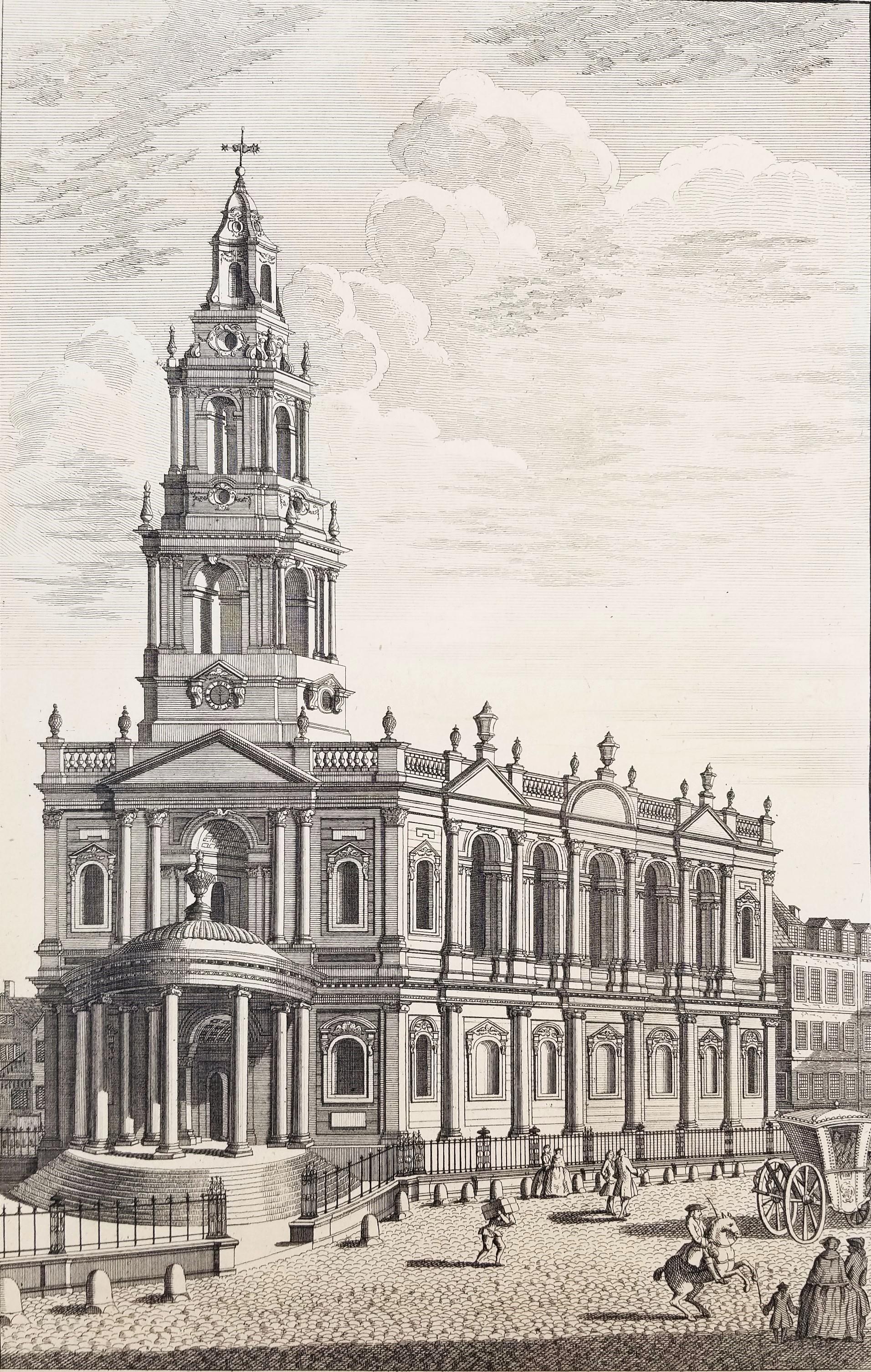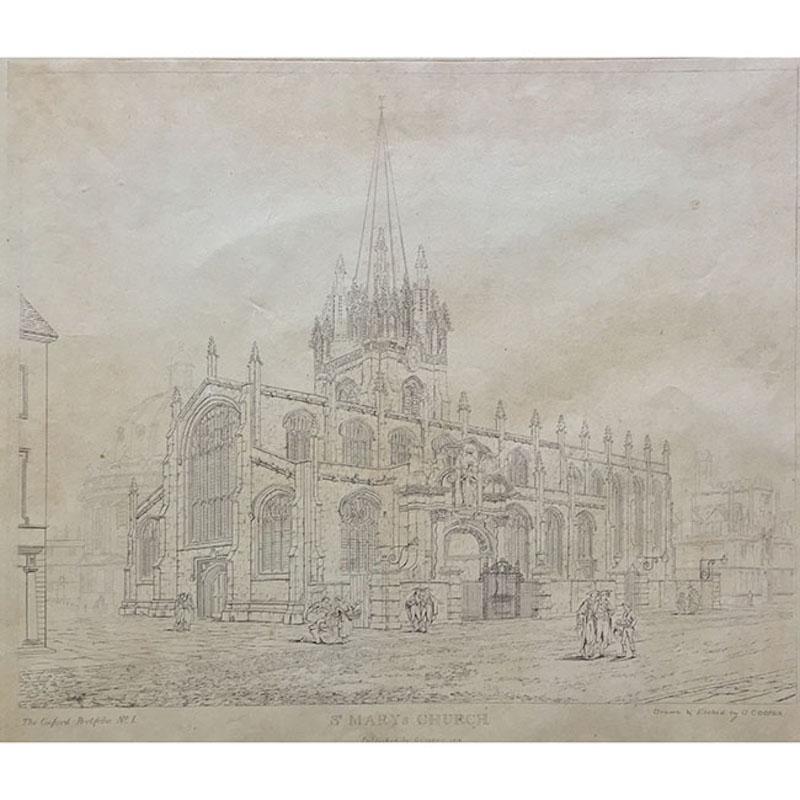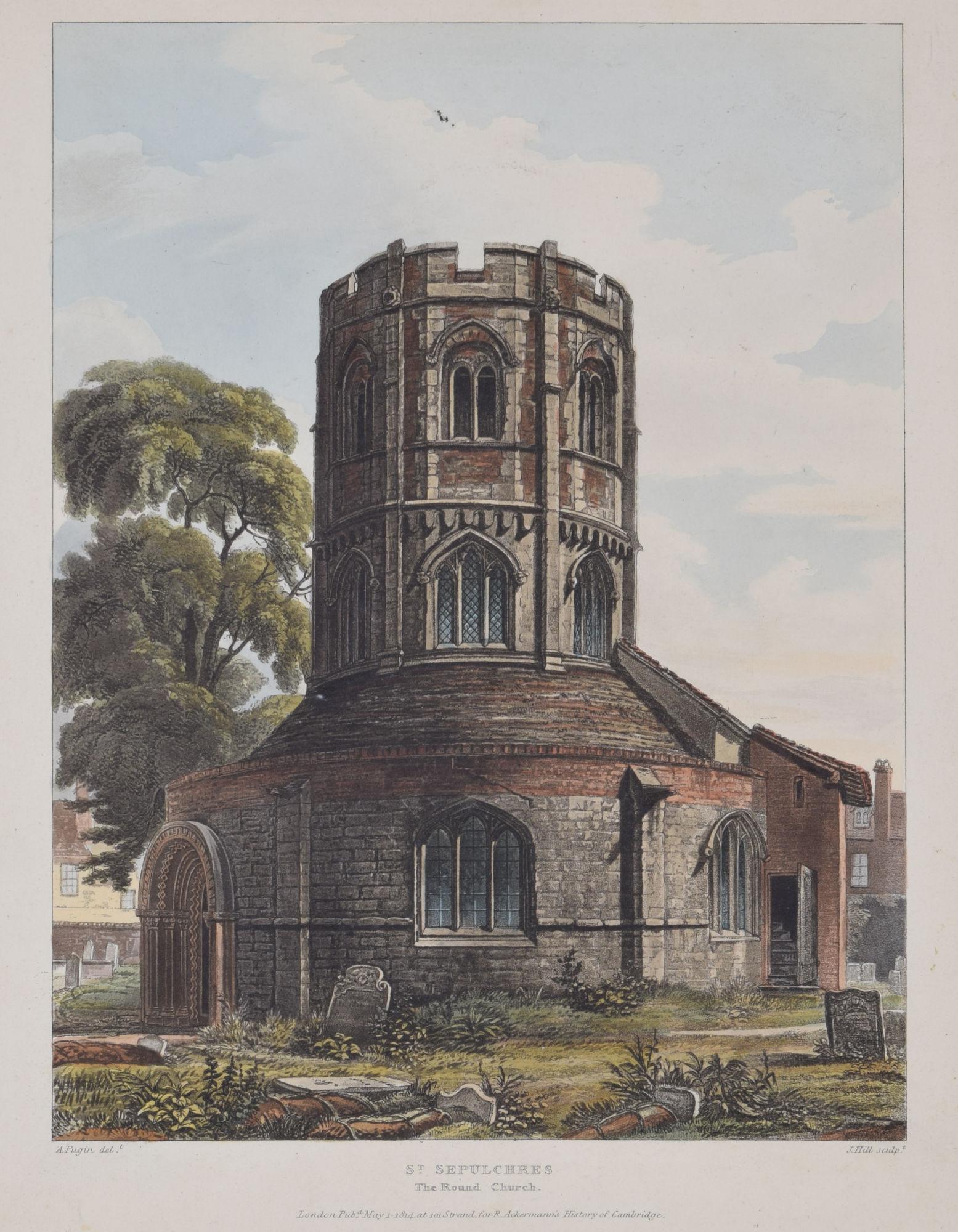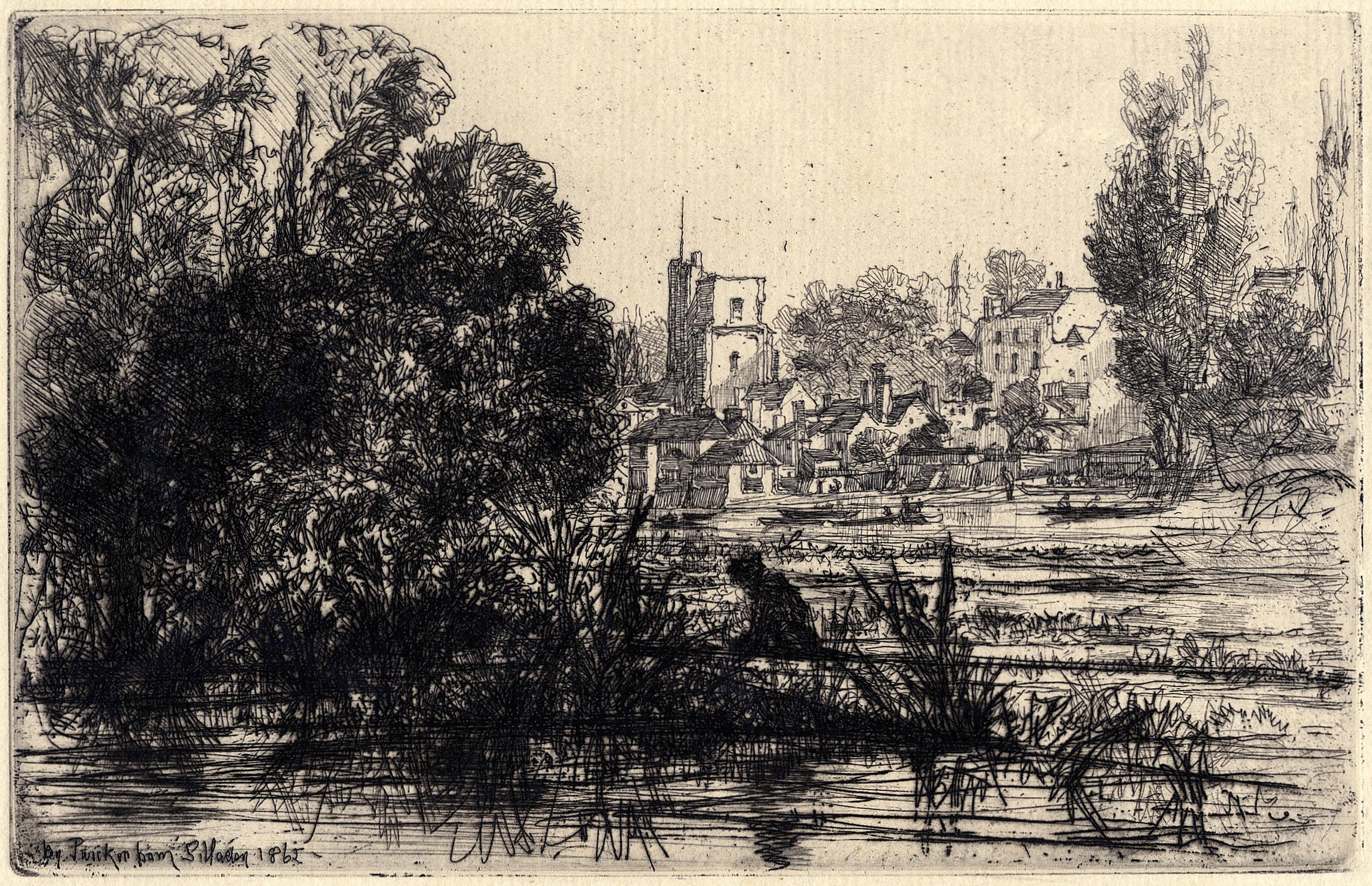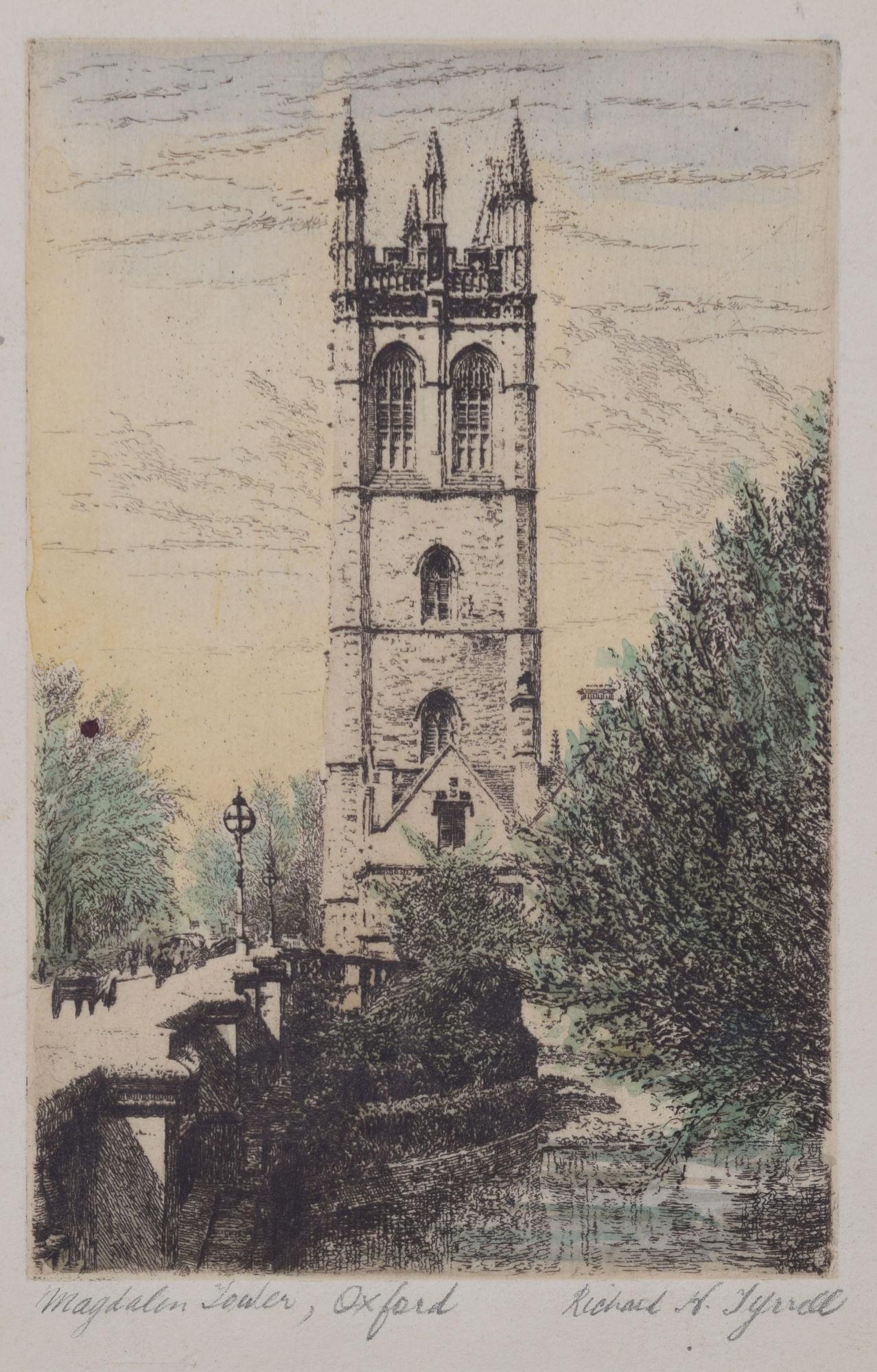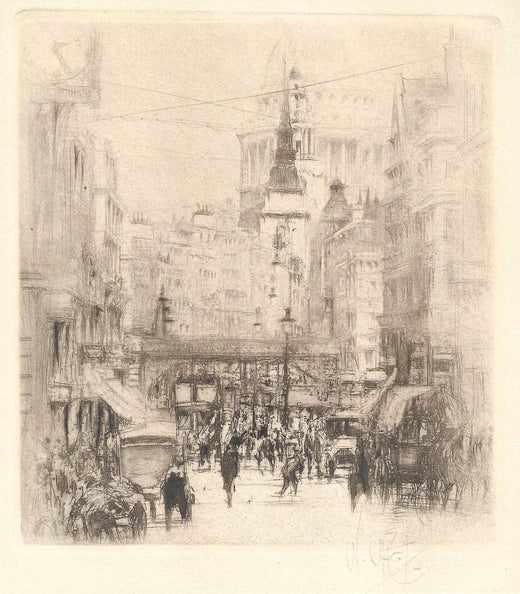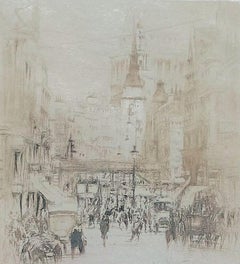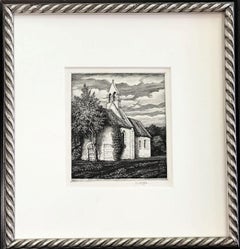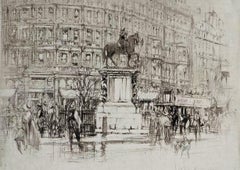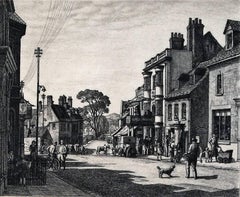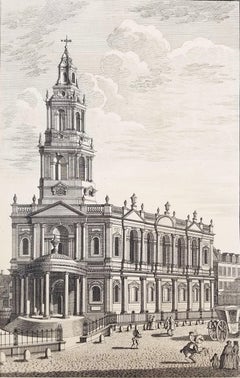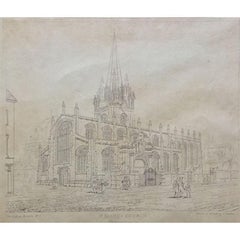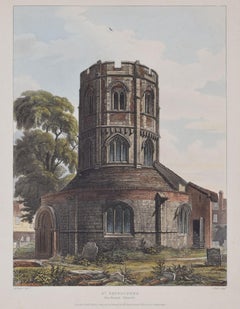Items Similar to Chelsea Old Church, London
Want more images or videos?
Request additional images or videos from the seller
1 of 5
William Walcot R. E. Hon. R. I. B. A.Chelsea Old Church, London1924
1924
$400
$50020% Off
£301.87
£377.3420% Off
€345.59
€431.9920% Off
CA$564.13
CA$705.1720% Off
A$619.35
A$774.1820% Off
CHF 323.11
CHF 403.8920% Off
MX$7,494.96
MX$9,368.7120% Off
NOK 4,049.74
NOK 5,062.1820% Off
SEK 3,815.92
SEK 4,769.9020% Off
DKK 2,579.77
DKK 3,224.7120% Off
About the Item
Chelsea Old Church. 1924. Etching, drypoint, and aquatint. Dickins 94. 5 3/8 x 8 (sheet 8 1/2 x 9 3/4). Edition 100 for The Print Collector's Club. A fine proof with tonal wiping, printed on cream wove paper. Signed and dedicated "W.R. Button from W. Walcot London 1930" in pencil.
Chelsea Old Church, also known as All Saints, is an Anglican church, on Old Church Street, Chelsea, London SW3, England, near Albert Bridge. It is the church for a parish in the Diocese of London, part of the Church of England. Inside the Grade I listed building, there is seating for 400 people. There is a memorial plaque to the author Henry James (1843–1916) who lived nearby on Cheyne Walk. To the west of the church is a small public garden containing a sculpture by Sir Jacob Epstein.
When he was seventeen,William Walcot began to study architecture under Louis Benois at the Imperial Academy of Art in Saint Petersburg. He went to Paris where he continued his studies at the Ecole des Beaux-Arts and the Atelier Redon. He practiced as an architect briefly in Moscow, designing the Hotel Metropole in 1898.
In 1907, Walcot settled in London where he was employed as a draughtsman by the South-African-born architect, Eustace Frere. In 1933, Walcot designed one London building, 61 St. James Street, but his main architectural activity was that of a freelance draughtsman. He produced drawings and etchings for architects to show their clients and to exhibit at the Royal Academy summer exhibitions.
Throughout the 1920s and 1930s, Walcot was the most celebrated architectural draughtsman in England, enhancing the scale and drama of the buildings he depicted with his mastery of techniques including watercolor and gouache.
- Creator:William Walcot R. E. Hon. R. I. B. A. (1874 - 1943, British)
- Creation Year:1924
- Dimensions:Height: 5.38 in (13.67 cm)Width: 8 in (20.32 cm)Depth: 0.5 in (1.27 cm)
- Medium:
- Movement & Style:
- Period:
- Condition:
- Gallery Location:Storrs, CT
- Reference Number:1stDibs: LU335210331882
William Walcot R. E. Hon. R. I. B. A.
When he was seventeen, William Walcot began to study architecture under Louis Benois at the Imperial Academy of Art in Saint Petersburg. He went to Paris where he continued his studies at the Ecole des Beaux-Arts and the Atelier Redon. He practiced as an architect briefly in Moscow, designing the Hotel Metropole in 1898. In 1907, Walcot settled in London where he was employed as a draughtsman by the South-African-born architect, Eustace Frere. In 1933, Walcot designed one London building, 61 St. James Street, but his main architectural activity was that of a freelance draughtsman. He produced drawings and etchings for architects to show their clients and to exhibit at the Royal Academy summer exhibitions. Throughout the 1920s and 1930s, Walcot was the most celebrated architectural draughtsman in England, enhancing the scale and drama of the buildings he depicted with his mastery of techniques including watercolor and gouache.
About the Seller
5.0
Recognized Seller
These prestigious sellers are industry leaders and represent the highest echelon for item quality and design.
Established in 1977
1stDibs seller since 2016
725 sales on 1stDibs
Typical response time: <1 hour
Associations
International Fine Print Dealers Association
- ShippingRetrieving quote...Shipping from: Storrs, CT
- Return Policy
Authenticity Guarantee
In the unlikely event there’s an issue with an item’s authenticity, contact us within 1 year for a full refund. DetailsMoney-Back Guarantee
If your item is not as described, is damaged in transit, or does not arrive, contact us within 7 days for a full refund. Details24-Hour Cancellation
You have a 24-hour grace period in which to reconsider your purchase, with no questions asked.Vetted Professional Sellers
Our world-class sellers must adhere to strict standards for service and quality, maintaining the integrity of our listings.Price-Match Guarantee
If you find that a seller listed the same item for a lower price elsewhere, we’ll match it.Trusted Global Delivery
Our best-in-class carrier network provides specialized shipping options worldwide, including custom delivery.More From This Seller
View AllLudgate Hill
By William Walcot R. E. Hon. R. I. B. A.
Located in Storrs, CT
Ludgate Hill. 1921. Etching, aquatint, and drypoint. Dickins 69. 5 5/8 x 5 1/8 (sheet 13 5/8 x 9 3/4). A fine proof with plate tone, printed on 'J Wha[tman] cream wove paper. Edition of 275 for the UK and 125 for the US. Signed in pencil.
Ludgate Hill is a street that runs west from St. Paul's Churchyard to Ludgate Circus (built in 1864), and from there becomes Fleet Street. The Ludgate Hill railway station, between Water Lane and New Bridge Street, is a station of the London, Chatham, and Dover Railway. It was closed before World War II and the railway bridge and viaduct between Holborn Viaduct and Blackfriars stations was demolished in 1990 to enable the construction of the City Thameslink railway station in a tunnel. This also involved the regrading of the slope of Ludgate Hill at the junction. About halfway up Ludgate Hill is St Martin, Ludgate church. This was physically joined to the Ludgate.
When he was seventeen, William Walcot began to study architecture under Louis Benois at the Imperial Academy of Art in Saint Petersburg. He went to Paris where he continued his studies at the Ecole des Beaux-Arts and the Atelier Redon. He practiced as an architect briefly in Moscow, designing the Hotel...
Category
Early 20th Century Modern Landscape Prints
Materials
Drypoint, Etching, Aquatint
$400 Sale Price
20% Off
Netherton Chapel
By Frederick Landseer Griggs, R.A., R.E.
Located in Storrs, CT
Netherton Chapel. 1935. Etching. Comstock 53.v. 5 11/16 x 4 3/8 (sheet 8 15/16 x 6 1/2). Edition 85 in this state (total edition 88-89). Illustrated Fine Prints of the Year, 1936; Print Collector's Quarterly 26 (1939): 286. A fine impression on white laid paper with a partial crown watermark. Signed in pencil. Housed in a striking 11 1/2 x 10 7/8 wood and champagne gold frame.
According to Comstock "The subject is a small memorial chapel, now much more ruinous than the etching shows, near Bredon Hill...
Category
Mid-20th Century Modern Landscape Prints
Materials
Etching
$1,600 Sale Price
20% Off
Charing Cross - The Statue of Charles I.
By William Walcot R. E. Hon. R. I. B. A.
Located in Storrs, CT
Charing Cross -- The Statue of Charles I. 1919. Etching with aquatint and drypoint. 3 5/8 x 4 7/8 (sheet 9 1/8 x 11 3/8). A fine proof with tonal wiping, printed on cream-wove paper. Signed in pencil.
Charing Cross is located at the junction of the Strand, Whitehall, and Cockspur Street in Central London, England. The name originates from the Eleanor cross installed by King Edward I as a memorial to his wife, Eleanor of Castile at the former hamlet of Charing. Since 1675, the cross site has been occupied by a statue of King Charles I mounted on a horse. The pedestal is thought to be designed by Wren and carved by Grinling Gibbons.
Chelsea Old Church, also known as All Saints, is an Anglican church, on Old Church Street, Chelsea, London SW3, England, near Albert Bridge. It is the church for a parish in the Diocese of London, part of the Church of England. Inside the Grade I listed building, there is seating for 400 people. There is a memorial plaque to the author Henry James (1843–1916) who lived nearby on Cheyne Walk. To the west of the church is a small public garden containing a sculpture by Sir Jacob Epstein.
When he was seventeen,William Walcot began to study architecture under Louis Benois at the Imperial Academy of Art in Saint Petersburg. He went to Paris where he continued his studies at the Ecole des Beaux-Arts and the Atelier Redon. He practiced as an architect briefly in Moscow, designing the Hotel...
Category
Early 20th Century Modern Landscape Prints
Materials
Drypoint, Etching, Aquatint
$780 Sale Price
20% Off
Wareham, Dorset
By Stanley Roy Badmin
Located in Storrs, CT
Beetles 36. 5 1/4 x 6 1/4 (sheet 9 1/4 x 11 1/4). Edition 50 for the Print Collector's Club. Exhibited: Royal Academy, 1934; Royal Society of Painter-Etchers and Engravers, 1934 and ...
Category
Early 20th Century Modern Landscape Prints
Materials
Etching
$1,250 Sale Price
21% Off
The Thames from Waterloo.
By William Walcot R. E. Hon. R. I. B. A.
Located in Storrs, CT
The Thames from Waterloo Bridge. 1913. Etching. Dickins 12. 3 3/4 x 7 1/16 (sheet 7 x 10 15/16). Edition 100. A fine proof with tonal wiping, printed on cream-wove paper. Signed in pencil.
Architectural draughtsman, etcher. Born in Lustdorf, near Odessa, Russia, to a British father and Russian mother. Traveled extensively with his family before studying architecture in St Petersburg, with further studies at Ecole des Beaux-Arts and Atelier Redan, Paris. Practiced architecture in Moscow and was co-designer of the Metropole Hotel, in 1898. Moved to London in 1907 and was employed as an architectural perspectivist. After a sponsored visit to Rome and Venice he had a solo exhibit at the Fine Art Society, 1912, 'Watercolours of London and Venice'; followed by a further four shows. He also exhibited at the Royal Academy, Royal Society of British Artists, Royal Society of Painter-Etchers..., and Connell & Sons. His etchings were published in London by H C Dickens,1913-24, and a folio of his work 'Architectural watercolors and etchings of William Walcot' was published, in 1919. Elected RE, 1920; FRIBA, 1922; Associate British School at Rome. A foremost architectural draughtsman, he worked from studios in London, Oxford and Rome.
The complete set of The Arteries of Great Britain includes: The Thames, The Tyne, The Forth, The Clyde, The Mersey. Signed in pencil .Housed in a 16 x 20 inch mat suitable for framing.
Opened in 1890, the Forth Bridge...
Category
Early 20th Century Modern Landscape Prints
Materials
Etching
$620 Sale Price
20% Off
The Thames and the Tower of London
By William Lionel Wyllie
Located in Storrs, CT
The Thames and the Tower of London. 1924. Etching and drypoint. 6 3/8 x 14 3/4 (sheet 10 1/4 x 17 1/4). Mat line; otherwise fine condition. A rich impr...
Category
1920s Modern Landscape Prints
Materials
Drypoint, Etching
$975 Sale Price
22% Off
You May Also Like
The South West Prospect of St. Mary's Church in the Strand /// William Maitland
Located in Saint Augustine, FL
Artist: Benjamin Cole (English, c. 1697-1783)
Title: "The South West Prospect of St. Mary's Church in the Strand"
Portfolio: The History and Survey of London from its Foundation to t...
Category
1750s Old Masters Landscape Prints
Materials
Engraving, Laid Paper, Intaglio, Etching
St Nicholas Cole Abbey and St Mary Somerset Church, London, The Blitz
Located in London, GB
This drawing records the destruction that was endured by London during the Blitz. The building in the foreground is St Nicholas Cole Abbey, situated in the city of London. Whilst a church was recorded on this site from the twelfth century, this church was destroyed in the Great Fire of London so the remnants of the church that we see here is one that was built by Sir Christopher Wren...
Category
Mid-20th Century Modern Landscape Drawings and Watercolors
Materials
Paper, Watercolor, Graphite
G Cooper: 'St Mary's Church, Oxford' etching on paper
Located in London, GB
To see our other views of Oxford and Cambridge , particularly suitable for wedding and graduation presents, scroll down to "More from this Seller" and below it click on "See all from...
Category
19th Century Realist Landscape Prints
Materials
Etching
St Sepulchre, The Round Church, Cambridge exterior after Pugin for Ackermann
Located in London, GB
To see our other Oxford and Cambridge pictures, including an extensive collection of works by Ackermann, scroll down to "More from this Seller" and below it click on "See all from this Seller" - or send us a message if you cannot find the view you want.
John Hill (1770 - 1850) after Augustus Charles Pugin (1762 - 1832)
St Sepulchre's - The Round Church (1814)
Aquatint with original hand colouring
24 x 29 cm
Published by Rudolph Ackermann (1764 - 1834).
An engraving of the Church of the Holy Sepulchre, Cambridge, the round shape of which is inspired by the rotunda in the church of the Holy Sepulchre, Jerusalem.
John Hill was born in London in 1770, and was an engraver's apprentice. He worked in aquatint and largely produced book illustration aquatints. He went to America in 1816 and produced the notable Picturesque Views of American Scenery amongst other books of prints.
Augustus Charles Pugin was an Anglo-French artist and architectural draughtsman. Pugin produced views of London, jointly creating the illustrations for the 'Microcosm of London' published by Rudolph Ackermann in 1811, followed by plates for Ackermann's books about Westminster Abbey, Oxford and Cambridge universities, and Winchester College. His later works included illustrations for Specimens of Gothic Architecture (1821–1823), The Royal Pavilion at Brighton (1826), Architectural Antiquities of Great Britain (1826), Specimens of the Architectural Antiquities of Normandy (1827), Illustrations of the Public Buildings of London (1825 to 1828), Paris and its Environs (1829 to 1831), and Examples of Gothic Architecture (1831). He also produced a book of furniture designs called Gothic Furniture, and assisted architects with detailing for their gothic designs. He ran a drawing school at his house in Bloomsbury.
Ackermann was an Anglo-German bookseller, inventor, lithographer, publisher and businessman. He attended the Latin school in Stollberg, but his wish to study at the university was made impossible by lack of financial means, and he therefore became a saddler like his father.
He worked as a saddler and coach-builder in different German cities, moved from Dresden to Basel and Paris, and then, 23 years old, settled in London. He established himself in Long Acre, the centre of coach-making in London and close to the market at Covent Garden.
Ackermann then moved to Little Russell Street where he published Imitations of Drawings of Fashionable Carriages (1791) to promote his coach-making. Other publications followed. In 1795 he established a print-shop and drawing-school at 96 Strand. Here Ackermann set up a lithographic press and began a trade in prints. He later began to manufacture colours and thick carton paper for landscape and miniature painters. Within three years the premises had become too small and he moved to 101 Strand, in his own words "four doors nearer to Somerset House", the seat of the Royal Academy of Arts.
Between 1797 and 1800 Ackermann rapidly developed his print and book publishing business, encompassing many different genres including topography, caricature, portraits, transparencies and decorative prints.
During the Napoleonic wars, Ackermann was an energetic supporter of the Allied cause and made significant contributions to British propaganda through his publication of anti-Napoleonic prints...
Category
1810s Prints and Multiples
Materials
Aquatint
Twickenham Church
By Sir Francis Seymour Haden, R.A.
Located in Middletown, NY
A luminous first state impression, Hamerton's "Portfolio" edition. Etching and drypoint on cream wove paper, 7 3/16 x 9 15/16 inches (135 x 213 mm), wide margins. First state (of 5)...
Category
Mid-19th Century Realist Landscape Prints
Materials
Etching, Drypoint
Magdalen College, Oxford Tower etching by Richard H Tyrell
Located in London, GB
To see our other views of Oxford and Cambridge, scroll down to "More from this Seller" and below it click on "See all from this Seller" - or send us a message if you cannot find the ...
Category
Late 19th Century Landscape Prints
Materials
Etching
More Ways To Browse
Church Antique
Antique Chelsea
Hotel Metropole
Kiyoshi Woodcut
Lawrence Nelson Wilbur
Lithograph Prints Of Architecture
Merton College
Paris Etching Society
Phil Greenwood
Prints Claude Monet
Vlaminck Signed
Wu Guanzhong
Aaa Sign
Africa Maps By Emanuel Bowen
Alfredo Muller
Antique House Architectural Design
Antique Postcards 1900
Ashley Andrew
